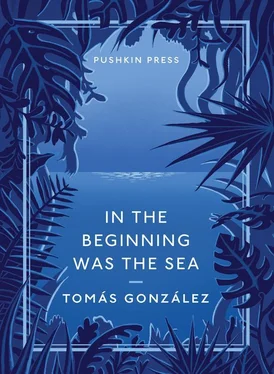He felt a rough tongue lick at his knee and his heart leapt into his throat. He let out a hoarse scream, swore at the dog and kicked it in the belly. The animal howled, ran off and sat cowering at the far end of the veranda and stared at him. When the surge of fear subsided, J. felt a pang of remorse, and he called the dog over and stroked its head. It was a medium-sized animal with sandy fur called Kaiser.
“Kaiser, you little fucker, you gave me a fright,” he whispered. “Bad Kaiser, you mangy fucking mutt.”
The animal, being a stray and not used to being petted, started to whimper quietly. When it tried to lick his feet, J. pushed it away gently.
“Down, boy!” he said, and the animal lay next to the chair.
After too many cigarettes and too much brooding about his life, J. could feel sleep, like the dawn, was drawing near. When he went back to bed, he found Elena sprawled in the same position. “She can even be angry in her sleep,” he thought. Elena spent the following morning at the sewing machine, working in silence. At midday, she put on her swimsuit and went down to the sea; she returned at two o’clock and started on a stock inventory in the shop.
So far, sales had been barely satisfactory. A month after opening, it was obvious that they could not count on the shop as their principal source of income. The locals were poor and bought too much on credit. Besides, with other shops in the region competition was fierce and somehow they managed to keep J.’s neighbours as customers.
The money J. and Elena had set aside to live on was draining away and they urgently needed to find a reliable source of income. J. had done some rough calculations to see how much the timber business might bring in, but he wanted to explore every possibility before deciding to cut down trees, an idea he found deeply repugnant.
Only a hundred of the two hundred hectares that made up the finca were pastureland; the remainder was dense virgin rainforest full of kapoks, oaks and cashew trees. If they were to decide to go into the lumber business, it would be all or nothing, and they would have to quickly process as much timber as possible. J. had already given some thought to where he might build accommodation for the lumbermen, calculating that they would need ten labourers at most. Julito had promised to provide cheap, secure transport as far as Turbo and also offered to put him in touch with a timber merchant who could supply the men he needed, when he needed them. He explained to J. the sort of contract he should draw up: labourers were paid a fixed price per timber float and fixed expenses were deducted from their monthly salary.
Four hundred thousand pesos in capital would be needed to begin work and J. realized that, barring some miracle, he would have to go back to Medellín in two months and persuade Fernando to extend his loan. Even if the banker did agree, every last peso would have to be ploughed into the business in order to be able to meet the repayments while he and Elena would have to live frugally.
July 13, 1976: Four days Elena’s been sulking. Nothing I do makes any difference. I’ve no idea what the fuck she sews with that machine, but I hear it whirring all day long. I’ve tried apologizing but she doesn’t even answer. Probably best to leave her to herself, let her calm down in her own time.
We need to do another trip to Turbo, there’s no rice, no oil and we’re almost out of cigarettes. Let her go, maybe that will clear her head.
Two weeks now since it last rained, we’ve had to carry drums of water from the creek to irrigate the seedbeds, the cistern has packed up again. The hardest part — especially for Elena — is not having running water in the house. Don Eduardo was supposed to take a look at the pump, but he hasn’t come round yet. I hope the old man can do something to fix it because otherwise we’ll have to call out a plumber. The workings look simple enough, the pipes and the plumbing are a pain in the arse to fix. Maybe the Almighty through the intercession of Don Eduardo can manage it.
Yesterday, I went into the forest. The more I look at the trees, the more I hate the idea of having them cut down but, with things as they are, we might have no choice. I’ll be forced to practise the Ancient Arts of Axmanship, as the local poets call it. Make way for civilization, you puny fucking kapoks!
Elena set off for Turbo with a list of stock needed in the shop. It was still impossible to know what she was thinking. During the trip, she did not make a single mistake; she came back with everything they needed — including several items not on the list that she realized were running short — and was careful not to be gypped by the traders. But she returned as icily silent as she had left.
SHORTLY AFTERWARDS, they received a visit from Don Gabriel E., a millionaire from Medellín, who arrived with his son. Don Gabriel owned one of the neighbouring fincas —a vast estate farm spanning almost five hundred hectares — and the locals claimed he was a little stupid and a little crazy. He had bought the finca in the dead of winter while the whole area was waterlogged, only to watch in summer as it dried out to become parched as a piece of old leather. It had been a colossal mistake. In summer, his cattle had to be moved to the few fincas in the area that had water and pay to lease their grazing land. His majestic finca proved not only unprofitable, it was ruinously expensive.
Don Gabriel had become senile with old age. In order to avoid him making further costly mistakes, his son Ramiro now trailed him like a shadow. A young man with a domed forehead and a brusque, businesslike manner, he and J. had met while studying engineering at university.
“What’s new, hermano ?” Ramiro called down from his horse.
It was midday and J. was sitting out on the veranda digesting his lunch. He had seen the horses emerge from the woods but it took a moment before he recognized the riders. The horses plodded slowly along the beach. As the young man called out to him, he recognized them. “It’s that idiot Ramiro,” he thought, “and his idiot father…”
“ Qué tal , Ramiro?” he called back genially. “Come join me.”
When they stepped up onto the veranda, J. held out his hand. “Pleasure to see you, Don Gabriel,” he said to the old man.
“And you, young man,” said Don Gabriel, sitting in the wicker chair without waiting to be asked.
He was a man of about sixty-five, very pale and almost completely bald. Being raw-boned, when he sat down his ample paunch was pushed up to his sternum. Before losing his wits, Don Gabriel had been an overbearing man accustomed to being in control; now, his manner was vaguely paternal, an attempt to adopt the manner of the ageing patriarch of a respectable Antioquía family. He wore white shorts of the kind worn by tennis players and his badly sunburnt thighs were thickly smeared with milk of magnesia. He looked as though he had recently been ill; there were ulcerous red cold sores at the corners of his mouth. He wore sturdy black shoes that had clearly been bought to last.
“Sit here next to me, sonny,” he said, and J. inched his chair closer while trying to stay as far as possible from the old man. He did not like rich people, still less rich senile men who stank of milk of magnesia.
For some time, Don Gabriel questioned J. in a half-dictatorial, half-paternal tone. He asked how much his stud bull had cost, where J. had bought it and from whom; he enquired about the paddocks on the finca , the plans for the forest, the profitability of the shop and the proposed new house; he quizzed J. about his financial situation and his business ventures, past, present and future… And then, having quizzed him about everything under the sun — except how much water his finca had in summer — and seemingly satisfied with the vague answers he received, he took it upon himself to offer advice. Though no one had asked, he first gave a rambling disquisition on the best method of treating foot and mouth disease; he suggested — almost demanded — that J. plant a strain of multi-coloured corn developed in the United States; he expounded on the latest methods of artificial insemination; finally, he announced that Ramiro would only sell the finca over his dead body.
Читать дальше










